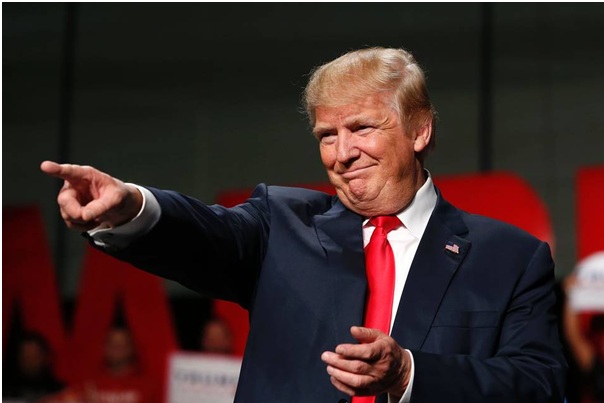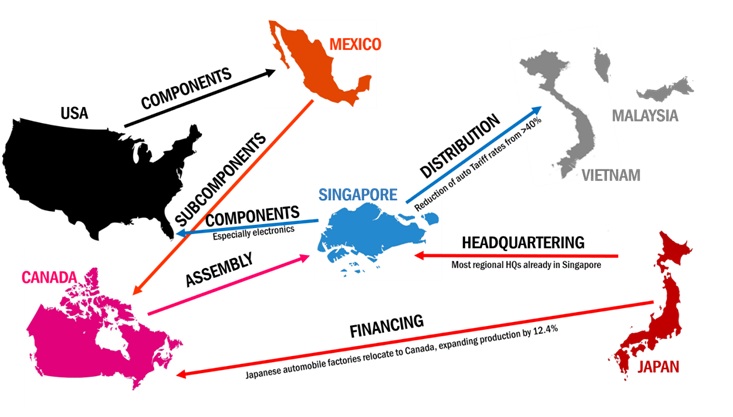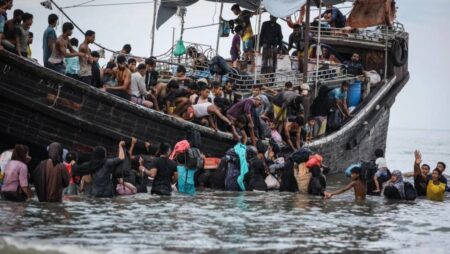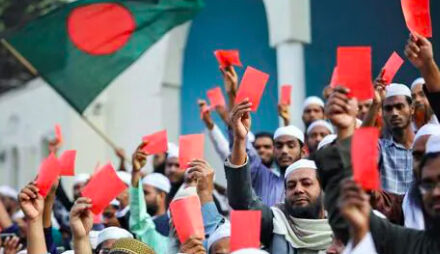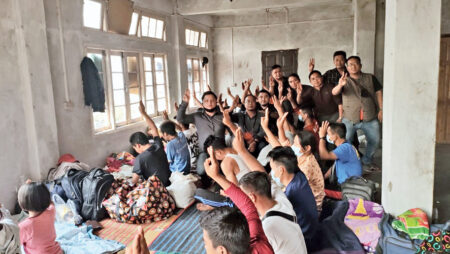MANTRAYA SPECIAL REPORT#08: 10 NOVEMBER 2016
Trump Presidency: How would it impact Singapore?
–
Boh Ze Kai
–
Abstract
Against all odds, Donald Trump has emerged as the candidate for the US Presidency in January 2017, raising the question, what now? Singapore has not featured prominently in statements made by the Trump campaign, but as an international business hub, is nonetheless prone to indirect effects of the many policies he has suggested. Much has been and will be written about impacts on Europe and America, this article will ignore all that and zoom in on the impact on Singapore if Trump really enacts the policies he claims he will, noting also that a combination of campaign perfidity, pragmatic limitations, the moderating effect of Congress and changing realities means Trump may not necessarily be able to do so.
–
Donald Trump has emerged winner in the US Presidential elections 2016, raising the question, what now? Singapore did not feature prominently in statements made by the Trump campaign, but as an international business hub, is nonetheless prone to indirect effects of the many policies he has suggested. Much has been and will be written about impact on Europe and America, this article will ignore all that and focus on the impact on Singapore if Trump really enacts the policies he claims he will, noting also that a combination of campaign perfidity, pragmatic limitations, the moderating effect of Congress and changing realities may not enable Trump to do so.
TRADE POLICY
Trump’s trade policy is best described as mercantilist and protectionist, sharply contrasting to the traditional Republican stand on free-trade. The overarching policy can largely be divided into two distinct stands: a targeted protectionist policy aimed at stemming imports (particularly from China), and an isolationist policy opposed to regional trade integration and multilateral free trade agreements:
Economic Reprisal
The first policy aims to raise the prices of imported goods on China through “countervailing duties of 45%, environmental and labour standards”, while simultaneously decreasing the cost to production of domestic goods through a “lowered corporate tax rate of 15 percent”[1]. China is the main target of this policy, as the country’s exports of US$733 billion far outweigh its imports of US$163 billion[2]. Trump has also accused China of “raping America[3]” by undervaluing its currency and imposing artificial barriers of trade on the USA. Nonetheless, China is not the only target; and Trump has also singled out Vietnam, Japan, India and Mexico for economic reprisals[4].
China
Trade restrictions placed directly on China will have severe repercussions on China’s export industry, particularly its manufacturing base into which Singaporean semi-finished goods flow. This will be a setback to Singapore’s ambitions to ride along China’s admittedly slowing growth, particularly considering that Singapore only recently announced it would act as a clearing house and regional gateway for RMB[5]. China continues to be Singapore’s largest investment destination at US$110 billion[6] as well as its largest trading partner in 2014. Combined with regional integration, the Singaporean economy has become intrinsically linked to the Chinese one, and a dip in Chinese demand for Singaporean inputs is likely to hurt Singaporean producers. However, China appears to have pre-empted American economic persecution and announced the One Belt – One Road (OBOR) plan in an effort to divert trade and industrial integration westwards towards Europe rather than eastwards across the Atlantic in a move that may be seen as trade warfare. Thankfully, Singapore is considered a lynchpin in the OBOR plan and a significant part of China’s trade diversion is likely to flow through Singapore as well.
Trump did make a passing reference to Singapore at a campaign rally in Florida, just a day before the elections, where he mentioned “Baxter Health Care Corporation laid off 199 workers and moved their jobs to Singapore.” This hardly translates to any real policy, but does indicate that Singapore is within Trump’s radar, which could result in tariff barriers and similar reprisals for American companies relocating operations to Singapore.
Mexico
Mexico has also been singled out as a region eroding the American economy and way of life through narcotics, illegal immigration and price manipulation. The proposed punitive policy involves the construction of a now legendary wall along the Mexican border paid for by promulgating legislature to prevent remittances, and 35 percent trade tariffs on many goods, particularly automobiles[7].With 90 percent of its exports going to its northern neighbour, this tariff is likely to cripple the export-based Mexican economy, but at the same time, will significantly impact American overseas supply chains, which capitalise on Mexico’s low-cost, high-skilled workforce for cheap manufacturing. In 2011, median hourly manufacturing wages in Mexico were US$6.48, compared to US$35.53 in the USA[8], not accounting for the legions of illegal immigrants who subsidise American production costs. Nonetheless, Mexico’s excess capacity could represent potential investment opportunities for manufacturers hoping to reduce production costs, though Singapore has traditionally been the one exporting manufacturing to Mexico while importing primarily petrochemicals.
Free Trade Agreements
The second policy sees a renegotiation of multilateral FTAs with a focus on attempting to create “fair trade” deals rather than “free trade” deals[9]. Trump has condemned the Trans-Pacific Partnership (TPP), a proposed free-trade area presently of 12 countries (including Singapore) encompassing 40 percent of global GDP, as “insanity[10]” and a “death blow for American manufacturing[11]”,considering its signatories to be currency manipulators and decrying the jobs which would allegedly be lost to overseas competition. Hillary Clinton had previously also vowed to revoke the TPP, but Trump’s anti FTA stance goes one step further. Trump has also denounced the North America Free Trade Agreement (NAFTA) between the USA, Canada and Mexico as a “disaster[12]” and vowed to renegotiate its terms under threat of invoking Article 2205 of the Agreement to withdraw.
Perhaps most drastically, in an interview with NBC’s “Meet the Press”, Trump has suggested pulling out of the World Trade Organisation (WTO), if the WTO blocked his moves to impose tariffs on relocating companies. The WTO has been a divisive organization, with suggestions that it remained passive in the face of flagrant Chinese abuse of its tariff rules, but withdrawing from it is an unprecedented suggestion. Practically, the WTO exists to keep global trade barriers low, and remaining outside it would mean exposing the US to a slew of retaliatory tariffs while removing the US’ most effective means of confronting Chinese trade policy. China’s ascension to the WTO in 2001 saw it accept a basket of conditions, including reducing effective tariff rates from 54 percent in 1985 to 8.45 percent by 2001[13]. Even on Election Day, the US had succeeded in establishing a panel at the WTO to confront Chinese exports in raw materials. The breakdown of the WTO would be a serious blow to Singapore, whose policy of zero tariffs relies on reciprocity with other countries.
As a transshipment hub, Singapore relies on international integration of supply and manufacture processes to power the economy. Singapore has profited greatly from the recent trend of trade liberalisation, and has 21 effective bilateral and multilateral free trade agreements (FTAs).Singapore has been looking forward to the benefits of the TPP, particularly for manufacturing SMEs, derived from regional cumulation creating new supply and production chains using TPP-derived inputs, while making pre-existing ones cheaper. The TPP is also notable for its stance on the liberalisation of the services sector, including financial and business consultancy sectors. Nonetheless, a renegotiation of the USA’s involvement in the TPP may not directly affect Singaporean exports, as Singapore already has free trade agreements in force with 9 of the 11 other signatories, including the US. However, the blow to transnational industries for which there is potential to integrate with Singaporean one could significantly reduce revenues for Singaporean operations. The automobile industry in particular had high expectations, with experts welcoming the removal of tariff barriers as high as 70 percent in Vietnam and 30 percent in Malaysia, forecasting a 12.4 percent growth for Japanese automobile firms, with direct and indirect benefits for Singapore (see Figure 1)[14].
Table 1: Hypothetical production chain for Japanese automobile industry
FOREIGN POLICY
Muslims
While American domestic policy, by definition, does not affect the rest of the world at large, policies directed at specific ethnicities are likely to incite backlash from the populations of countries with these ethnicities. Having accused the Muslim community of having “strong hate against America”, the very strongly-worded Muslim policy includes a “national database, surveillance and watchlist[15]”, and a “total and complete shutdown of Muslims entering the United States.[16]”Active diplomacy and national interest is likely to cushion the impact on intergovernmental relations with Muslim countries; but popular sentiment will be decidedly negative and hostile and may inspire acts of terrorism as reprisal. Singapore, with its large Muslim population, will no doubt face domestic pressures to condemn this behaviour, and the Ministry of Foreign Affairs must move quickly to ensure Singaporean Muslims will be unaffected.
Antagonising the Muslim population is likely to be welcomed by Beijing, which has seized on the slow ebb of American influence to insert itself into the Middle East. The economic overture has been the most significant, with China’s launch of the “1+2+3” formula of economic cooperation in the Middle East: 1 ‘Heart’ of energy cooperation, 2 ‘Wings’ of infrastructure and investment, and 3 ‘breakthroughs’ of nuclear energy, green energy and aerospace engineering. A new development is the Arab Policy Paper published in 2016, in which China outlined several security initiatives, including cooperation in military technology, anti-terrorism operations and joint military exercises[17].
Iran
The Republican candidate has consistently condemned the Islamic Republic of Iran as the “leading state sponsor of terror” and denounced the nuclear deal with Iran as “the worst deal ever[18]”. Businesses, particularly in Europe have also swiftly re-entered the Iranian market since the conclusion of negotiations, with Airbus inking a US$12 billion deal to provide aircraft to replace Iran’s aging fleet[19] and Peugeot securing a US$500 million joint venture with Iran Khodro[20]. Singapore has also signed a Bilateral Investment Treaty in February 2016[21], aiming to reduce barriers for Singaporean investments. He pledges to “dismantle the disastrous deal”, essentially reimposing economic sanctions which were lifted in January 2016, and further proposes to “double up or triple up sanctions”. This would be very damaging to the Iranian economy, which has already been making arrangements to export its sanction-free oil and only just reconnected its hitherto isolated financial system to the SWIFT banking infrastructure in May 2016. A new wave of American sanctions to punish firms which have only just started doing business in Iran would be highly disruptive, and Singaporean firms should hold back until American economic sanction policy acquires some semblance of coherence.
Syria
Trump’s Syria policy essentially allows Russia and Iran to place Bashar al-Assad back in power[22], trading the destruction of the greater evil (the Islamic State) for this lesser evil. Trump is further convinced of direct American involvement, promising to put troops on the ground and persuade other nations to participate in “bombing the shit out of ISIS[23]”. Morality aside, definitively crushing the polity that is the Islamic State will at least bring stability to the troubled region, reducing security woes for Singapore regarding the proliferation of ISIS splinter cells across Southeast Asia, particularly since Singapore has no history of animosity with the Assad regime. American military intervention across the Middle East has consistently created security issues across the globe, and his pledge to “never enter into any conflict unless it makes us safer as a nation[24]” will be a welcome end to the direct or indirect American hand in creating and aggrandizing countless terrorist organisations.
The resurgence of Russia as a diplomatic powerhouse is matched by Trump’s commitment to “an easing of tensions and improved relations with Russia.[25]” Recognising the legitimacy of Russian involvement in defusing international conflicts reflects the emergence of a new challenge to American unipolarity. The increased confidence from such a manoeuvre could see Russia deploy in areas beyond its immediate interests, which it has shied away from doing since the days of the Soviet Union. Singapore-Russia relations have been generally unremarkable, with the first Russian head of state visit made only in 2009 and a condemnation issued for Crimea’s ascension to the Russian Federation in 2014[26]. Nonetheless, pragmatic Singapore is likely to match American efforts to grow closer to Russia, and may even welcome the move as defusing fears of an Eastern-Western conflict.
East Asia
Trump’s policy in East Asia focuses on three main points: Firstly, he pledges to increase military spending and “develop, build and purchase the best equipment known to mankind[27]”in order to “discourage Chinese adventurism that imperils American interests.” Secondly, he asserts that providing nuclear arsenals to Japan and South Korea is “going to happen anyway” and “wouldn’t be a bad thing for us.[28]” Thirdly, he threatens to draw down American troops based in Japan and South Korea unless the two countries significantly increase contribution to their upkeep, while renegotiating defence pacts, such as the USA-Japan Treaty of Mutual Cooperation and Security (TMCS) signed in 1951,[29] in order to reduce defence obligations.
On the whole, this somewhat contradictory policy is likely to aggrandise tensions in the region. China has been accused of expansionist manoeuvres in the South China Sea and militaristic behaviour towards Japan, adding uncertainty to a US$5 trillion a year trade corridor on which Singapore’s trade routes are dependent. Stubborn American diplomacy and calculated military threats have so far served to limit China’s actions against its neighbours, as the TMCS was clarified to include the contested islands in the South China Sea. The situation is undoubtedly heating up, as China accelerates production of its feared ‘ship-killer’ DF-21D and DF-26 missiles, while the US undertakes freedom of navigation exercises such as the sailing of a carrier strike group led by the USS John C. Stennis into the South China Sea in March 2016. Nonetheless, barring a dramatic escalation on either side, conflict seems unlikely at this point.
The dramatic escalation could come from a strengthening of American naval positions and ground forces insinuated by the increased military spending, as well as a policy of aggressively checking Chinese activities. While enforcing Cold War-style mutually assured destruction, nuclear reproliferation in the region would further destabilise relations between the powers, shifting negotiations from a position of compromise and dialogue into one of threat. Finally, while it is likely that Japan and South Korea may be blackmail into paying more for the upkeep of American forces, the loss of trust and reneging of defence obligations is likely to result in Japan accelerating its remilitarisation in recognition of American perfidity.
This alarming chain of events would be a blow to Singapore, whose very prosperity relies on regional stability and free trade across the Asia- Pacific region. Singapore has long tried to play the peacemaker in this conflict, including hosting events such as the Shangri-La Dialogue, Sino-ASEAN Dialogue, and the 2016 ASEAN-China Special Kunming Meeting to promote multilateral exchange of ideas, and suggesting an interim Code of Unplanned Encounters at Sea to defuse tensions[30], but has constantly reiterated its status as a ‘non-claimant’. Singapore aims to see the dispute resolved before any sort of disruptive conflagration can take place and has consistently supported American deployments, including the basing of P-8 spy planes in 2015[31] and numerous joint exercises like Cooperation Afloat Readiness and Training[32], ever since signing the Strategic Framework Agreement in 2005 acknowledging mutual benefit from a strong American presence. With deterrence escalating into possible actual conflict, Singapore would need to redouble efforts to bring everybody to the negotiating table, or otherwise work to rebalance the situation through engagement with non-American actors.
Despite several gaffes, not least the Global Times’ bizarre attack on Singapore, the situation in the South China Sea appears to be de-escalating, primarily due to changes in foreign policy for parties involved. Duterte’s snubbing of American foreign policy and open declaration to “open alliances” with Russia and China, has been welcomed by Beijing, who extended a red-carpet welcome to him in October denied even to Obama at the G20 meeting in September, and pledged billions of dollars of deals with Philippines. Elsewhere, Thailand signalled a shift in military relationships by procuring from China 28 battle tanks and 3 submarines[33], while Malaysia pledged naval cooperation with Beijing specifically in the South China Sea. The threat of the South China Sea as a battleground, Singapore’s worst fear, appears to have subsided for the moment. (see Figure 2)
 Figure 2: Territorial claimants in the South China Sea dispute[34]
Figure 2: Territorial claimants in the South China Sea dispute[34]
One interesting development could arise from the re-entry of Russia into the global diplomatic stage. While Singapore is uniquely positioned as a friend of both China and the US, Russia has the military clout and the diplomatic size to engage the two countries as equals. Russia has stayed uninvolved due to close ties to both China and the rest of Asia-Pacific, however, growing rapprochement with the USA and confidence post-Syria could draw Russia in to mediate between the two and prevent any unnecessary escalation.
CONCLUSION
Trump’s speeches and campaign promises reflect a slaughtering of much of America’s traditional foreign and domestic policy holy cows. Nonetheless, a new trend has begun to emerge in the Trump campaign – moderation. Early in the campaign, Trump has suggested that upon election he would become significantly more “presidential”, and was quoted as saying “I will be changing very rapidly. I’m capable of changing to anything I want to change to[35]“. The Republican candidate has already begun backing down on several issues such as abortion[36], skilled immigration and assault weaponry[37]. Changing stances on issues is commonplace in American politics, even upon taking office, and it remains to be seen if his other radical policies are subject to similar vagaries. Trump has given indications that much of what he says is political bluster, recalling his 1990 Playboy interview, it might be that the irrational radicalism could just be “props for the show, the show is Trump, and it has sold-out performances everywhere”.
NOTES
[1]Trump, J. Donald (2016)
[2] US Census Bureau (2016)
[3] CNN (2016)
[4]Trump, J. Donald (2016)
[5]Monetary Authority of Singapore (2014)
[6]Singstat (2016)
[7] Trump, J. Donald (2016)
[9]Daily Caller (2015)
[10]Breitbart News (2015)
[11]Trump, J. Donald (28 Jun 2016)
[12]CBS News (2015)
[13]Bransetter, Lee (2008)
[14]Head, Keith (13 Nov 2015)
[15]NBC (2015)
[16]Trump, J. Donald (20 Nov 2015)
[17]Xinhua News (13 Jan 2016)
[18]Trump, J. Donald (21 Mar 2016)
[19] BBC News (2016)
[20] International Business Times (2016)
[21] Ministry of Trade and Industry (29 Feb 2016)
[22]Fox News Network (2016)
[23] Trump, J. Donald (13 Feb 2016)
[24]Trump, J. Donald (7 Jun 2016)
[25]Trump, J. Donald (27 Apr 2016)
[26]Ministry of Foreign Affairs, Singapore (2014)
[27]Trump, J. Donald (27 Apr 2016)
[28] New York Times (2016)
[29] New York Times (2016)
[30] Channel News Asia (2016)
[31] U.S. Department of Defence (2015)
[32]MINDEF (2015)
[33]Voice of America (26 May 2016)
[34]Voice of America (31 Jul 2012)
[35]Donald, J. Trump (13 Feb 2016)
[36]Donald, J. Trump (30 Mar 2016)
[37] Donald, J. Trump (03 Mar 2016)
–
REFERENCES
Bloomberg News. 18 Mar 2016. Trump Would Be ‘Impeached’ for His China Tariff, Chamber’s Donohue Says. New York: Bloomberg News. http://www.bloomberg.com/news/articles/2016-03-18/trump-china-tariff-bad-for-business-consumers-chamber-s-donohue. Accessed on 08 May 2016.
BBC News. 28 Jan 2016. Airbus signs $25bn deal to sell 118 planes to Iran. London: BBC News. http://www.bbc.com/news/business-35434483. Accessed on 07 May 2016.
Bransetter, Lee. 2008. “China’s embrace of globalization”, in Brandt, Loren; Rawski, G. Thomas, China’s Great Transformation, Cambridge, UK: Cambridge University Press, p. 65
Breitbart News. 09 Nov 2015. Exclusive — Donald Trump: Obama’s Trans-Pacific Free-Trade Deal Is ‘Insanity’. Los Angeles: Breitbart News. http://www.breitbart.com/big-government/2015/11/09/exclusive-donald-trump-obamas-trans-pacific-free-trade-deal-insanity/. Accessed on 07 May 2016.
CBS News. 27 Sep 2015. 60 Minutes with Scott Pelley – Trump. Available from http://www.cbsnews.com/news/donald-trump-60-minutes-scott-pelley/. Accessed on 08 May 2016.
Channel News Asia. 01 Mar 2016. Singapore suggests interim solution to South China Sea dispute. http://www.channelnewsasia.com/news/singapore/singapore-suggests/2562972.html. Accessed on 08 May 2016.
CNN. 02 May 2016. Trump: We can’t continue to allow China to rape our country. Atlanta: CNN. http://edition.cnn.com/2016/05/01/politics/donald-trump-china-rape/. Accessed on 07 May 2016.
Daily Caller.Donald Trump To Blast Obama Trade Pact In Radio Ads: ‘A Bad, BadDeal’. Washington DC: Daily Caller. http://dailycaller.com/2015/05/06/donald-trump-to-blast-obama-trade-pact-in-radio-ads-a-bad-bad-deal/#ixzz48335858U. Accessed on 07 May 2016.
Head, Keith. 13 Nov 2015.How will the TPP affect the auto industry?https://www.weforum.org/agenda/2015/11/how-will-the-tpp-affect-the-auto-industry/. Accessed on 07 May 2016.
International Business Times. Rouhani In France: Iran Signs $430M Deal With Peugeot; To Buy Over 100 Airbus Planes.http://www.ibtimes.com/rouhani-france-iran-signs-430m-deal-peugeot-buy-over-100-airbus-planes-2283847. Accessed on 07 May 2016.
MINDEF. Singapore and United States Hone Capabilities in Joint Maritime Exercise.http://www.mindef.gov.sg/imindef/press_room/official_releases/nr/2015/jul/13jul15_nr.html. Accessed on 08 May 2016.
Ministry of Foreign Affairs, Singapore. 21 Mar 2014.MFA Spokesman’s Comments in response to media queries on the Russian Parliament’s ratification of a treaty joining Crimea to Russia on 21 March 2014.http://www.mfa.gov.sg/content/mfa/media_centre/press_room/pr/2014/201403/press_20130321.printable.html?status=1. Accessed on 08 May 2016.
Ministry of Trade and Industry, Singapore. 29 Feb 2016. Singapore and Iran sign agreement to promote and protect investments. https://www.mti.gov.sg/NewsRoom/SiteAssets/Pages/Press-Release-on-Singapore-and-Iran-BIT/Press%20Release%20on%20Iran-Singapore%20BIT.pdf. Accessed on 08 May 2016.
Monetary Authority of Singapore. 27 Mar 2014.Singapore: Regional Gateway for RMB.http://www.mas.gov.sg/singapore-financial-centre/overview/regional-gateway-for-rmb.aspx. Accessed on 07 May 2016.
NBC. 20 Nov 2015. Trump’s plan for a Muslim database draws comparison to Nazi Germany.http://www.msnbc.com/msnbc/trump-would-certainly-implement-muslim-database. Accessed on 07 May 2016.
New York Times. 26 Mar 2016. Phone interview with Donald Trump. http://www.nytimes.com/2016/03/27/us/politics/donald-trump-transcript.html. Accessed on 08 May 2016.
Singstat. Apr 2016. Singapore’s Direct Investment Abroad, 2014. Available from http://www.singstat.gov.sg/publications/publications-and-papers/investment/singapore’s-direct-investment-abroad. Accessed on 08 May 2016.
Trump, J.Donald. 2016. Compelling Mexico to pay for the wall.https://www.donaldjtrump.com/positions/pay-for-the-wall. Accessed on 07 May 2016.
Trump, J. Donald. 2016. Reforming the US-China Trade Relationship to Make America Great Again. https://assets.donaldjtrump.com/US-China-Trade-Reform.pdf. Accessed on 07 May 2016.
Trump, J. Donald. 05 Dec 2015. Donald J. Trump statement on preventing Muslim immigration. Available from https://www.donaldjtrump.com/press-releases/donald-j.-trump-statement-on-preventing-muslim-immigration. Accessed on 07 May 2016.
Trump, J. Donald. 30 Mar 2016. Donald J. Trump statement on abortion. Available from https://www.donaldjtrump.com/press-releases/donald-j.-trump-statement-regarding-abortion. Accessed on 07 May 2016.
Trump, J. Donald. 13 Feb 2016. Ninth Republican Party presidential debate, February 2016 in Greenville, South Carolina. Available from https://www.youtube.com/watch?v=KJvolteKTXc. Accessed on 07 May 2016.
Trump J. Donald. 12 Nov 2015. Speech in Decker Auditorium in Fort Dodge, Iowa. Available from https://www.youtube.com/watch?v=ivi2g0C-Nlo. Accessed on 07 May 2016.
Trump J. Donald. 27 Apr 2016. Foreign Policy Speech at the Center for National Interest. Washington D.C.: Center for National Interest. Available from http://www.nytimes.com/2016/04/28/us/politics/transcript-trump-foreign-policy.html?_r=0. Accessed on 08 May 2016.
Trump J. Donald. 03 Mar 2016. Eleventh Republican Party presidential debate, March 2016 in Detroit, Michigan. Available from https://www.youtube.com/watch?v=fibAiW0fMSw. Accessed on 08 May 2016.
Trump J. Donald. 21 Mar 2016. Donald Trump Addresses the American Israel Public Affairs Committee. Available from http://time.com/4265810/watch-live-stream-online-donald-trump-aipac/?xid=homepage. Accessed on 08 May 2016.
Trump J. Donald. 7 Jun 2016. Donald Trump Speech at Briarcliff Manor, New York. Available from http://www.vox.com/2016/6/7/11880448/donald-trump-victory-speech-transcript. Accessed on 05July 2016.
Trump J. Donald. 21 Mar 2016. Donald Trump Speech in Monessen, Pennsylvania Available from http://time.com/4386335/donald-trump-trade-speech-transcript/. Accessed on 05July 2016.
Fox News Network. 11 Feb 2016. On the Record with Greta van Sustersen. New York: Fox News Network. Available from https://www.youtube.com/watch?v=1J2QKh6AtX8. Accessed on 07 May 2016.
U.S. Census Bureau. 2016. ForeignTrade: Trade in Goods with China. Washington DC: US Census Bureau. Available from https://www.census.gov/foreign-trade/balance/c5700.html. Accessed on 01 May 2016.
U.S. Department of Defence. 07 Dec 2015. Joint Statement by U.S. Secretary of Defense Ash Carter and Singapore Minister for Defence Dr. Ng Eng Hen.http://www.defense.gov/News/News-Releases/News-Release-View/Article/633200/joint-statement-by-us-secretary-of-defense-ash-carter-and-singapore-minister-fo
Voice of America. 26 May 2016. Thailand, China Step Up Military Cooperation. http://www.voanews.com/a/thailand-china-military-cooperation/3346960.html
Voice of America. 31 Jul 2012. Challenging Beijing in the South China Sea.http://blogs.voanews.com/state-department-news/2012/07/31/challenging-beijing-in-the-south-china-sea/
Xinhua News. 13 Jan 2016. Full text of China’s Arab Policy Paper.http://news.xinhuanet.com/english/china/2016-01/13/c_135006619.htm. Accessed on 09 Nov 2016.
–
(Boh Ze Kai is a Project Intern with Mantraya. This Special Report is published as part of Mantraya.org’s “Borderlands” and “Regional Economic Cooperation and Connectivity in Asia” projects.)
To Read previous Special Reports, CLICK HERE
